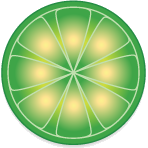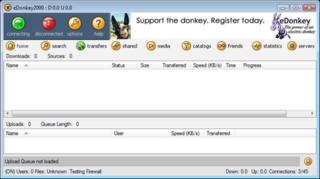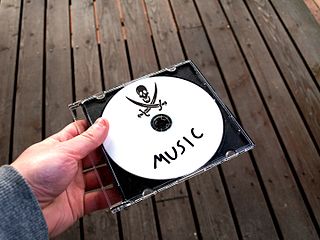Related Research Articles
Kazaa Media Desktop was a peer-to-peer file sharing application using the FastTrack protocol licensed by Joltid Ltd. and operated as Kazaa by Sharman Networks. Kazaa was subsequently under license as a legal music subscription service by Atrinsic, Inc., which lasted until August 2012. According to one of its creators, Jaan Tallinn, Kazaa is pronounced "ka-ZAH".

LimeWire was a free peer-to-peer file sharing client for Windows, MacOS, Linux and Solaris. Created by Mark Gorton in 2000, it was most prominently a tool used for the download and distribution of pirated materials, particularly pirated music. In 2007, LimeWire was estimated to be installed on over one-third of all computers globally.

Napster was a peer-to-peer file sharing application that originally launched on June 1, 1999 with an emphasis on digital audio file distribution. Audio songs shared on the service were typically encoded in the MP3 format. It was founded by Shawn Fanning, Sean Parker, and Hugo Sáez Contreras. As the software became popular, the company ran into legal difficulties over copyright infringement. It ceased operations in 2001 after losing a wave of lawsuits and filed for bankruptcy in June 2002.

eDonkey2000 was a peer-to-peer file sharing application developed by US company MetaMachine, using the Multisource File Transfer Protocol. It supported both the eDonkey2000 network and the Overnet network.

iMesh was a media and file sharing client that was available in nine languages. It used a proprietary, centralized, P2P network (IM2Net) operating on ports 80, 443 and 1863. iMesh was owned by American company iMesh, Inc., who maintained development centers around the world. As of 2009, it was the third most popular music subscription service in the US.
Madster was a peer-to-peer file sharing service. It was released in Napster's wake in August 2000 shut down in December 2002 as a result of a lawsuit by the Recording Industry Association of America.
i2hub was a peer-to-peer file sharing service and program designed and intended primarily for use by university and college students.
This is a timeline of events in the history of networked file sharing.

Peer-to-peer file sharing is the distribution and sharing of digital media using peer-to-peer (P2P) networking technology. P2P file sharing allows users to access media files such as books, music, movies, and games using a P2P software program that searches for other connected computers on a P2P network to locate the desired content. The nodes (peers) of such networks are end-user computers and distribution servers.

isoHunt was an online torrent files index and repository, where visitors could browse, search, download or upload torrents of various digital content of mostly entertainment nature. The website was taken down in October 2013 as a result of a legal action from the MPAA; by the end of October 2013 however, two sites with content presumably mirrored from isohunt.com were reported in media. One of them – isohunt.to – became a de facto replacement of the original site. It is not associated in any way with the old staff or owners of the site, and is to be understood as a separate continuation.
Arts and media industry trade groups, such as the International Federation of the Phonographic Industry (IFPI) and Motion Picture Association of America (MPAA), strongly oppose and attempt to prevent copyright infringement through file sharing. The organizations particularly target the distribution of files via the Internet using peer-to-peer software. Efforts by trade groups to curb such infringement have been unsuccessful with chronic, widespread and rampant infringement continuing largely unabated.
File sharing is the practice of distributing or providing access to digital media, such as computer programs, multimedia, program files, documents or electronic books/magazines. It involves various legal aspects as it is often used to exchange data that is copyrighted or licensed.

The use of the BitTorrent protocol for the unauthorized sharing of copyrighted content generated a variety of novel legal issues. While the technology and related platforms are legal in many jurisdictions, law enforcement and prosecutorial agencies are attempting to address this avenue of copyright infringement. Notably, the use of BitTorrent in connection with copyrighted material may make the issuers of the BitTorrent file, link or metadata liable as an infringing party under some copyright laws. Similarly, the use of BitTorrent to procure illegal materials could potentially create liability for end users as an accomplice.

Audiogalaxy was an Internet music service with three incarnations. From 1998 to 2002, it was a file sharing system that indexed MP3 files. From mid-2002 to mid-2010, it was a promotional website for the Rhapsody music subscription service. Finally, from mid-2010 through 2012, it was a personal audio place shifting service. Audiogalaxy ceased operations on January 31, 2013.
File sharing is the practice of distributing or providing access to digital media, such as computer programs, multimedia, documents or electronic books. Common methods of storage, transmission and dispersion include removable media, centralized servers on computer networks, Internet-based hyperlinked documents, and the use of distributed peer-to-peer networking.

The Recording Industry Association of America (RIAA) is a trade organization that represents the music recording industry in the United States. Its members consist of record labels and distributors that the RIAA says "create, manufacture, and/or distribute approximately 85% of all legally sold recorded music in the United States". RIAA is headquartered in Washington, D.C.
Scour Inc. was a multimedia Internet search engine, and provided Scour Exchange, an early peer-to-peer file exchange service.

Music piracy is the copying and distributing of recordings of a piece of music for which the rights owners did not give consent. In the contemporary legal environment, it is a form of copyright infringement, which may be either a civil wrong or a crime depending on jurisdiction. The late 20th and early 21st centuries saw much controversy over the ethics of redistributing media content, how much production and distribution companies in the media were losing, and the very scope of what ought to be considered piracy – and cases involving the piracy of music were among the most frequently discussed in the debate.

Arista Records LLC v. Lime Group LLC, 715 F. Supp. 2d 481, is a United States district court case in which the Southern District of New York held that Lime Group LLC, the defendant, induced copyright infringement with its peer-to-peer file sharing software, LimeWire. The court issued a permanent injunction to shut it down. The lawsuit is a part of a larger campaign against piracy by the Recording Industry Association of America (RIAA).
Metallica, et al. v. Napster, Inc. was a 2000 U.S. District Court for the Northern District of California case that focused on copyright infringement, racketeering, and unlawful use of digital audio interface devices. Metallica vs. Napster, Inc. was the first case that involved an artist suing a peer-to-peer file sharing ("P2P") software company.
References
- Lessig, Lawrence (2004). Free Culture : How Big Media Uses Technology and the Law to Lock Down Culture and Control Creativity. ISBN 1-59420-006-8. The Penguin Press. New York